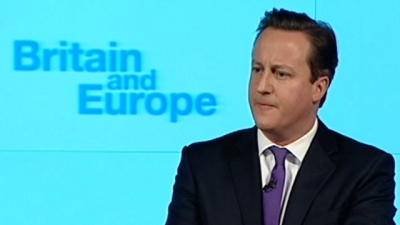With his EU speech yesterday, Boris Johnson seems to have reframed the rhetoric regarding a possible Brexit. By declaring that Britain could have a “great and glorious future” outside the EU and should not be scared about leaving if there are no reforms, we’ve subtly gone from “the EU must reform, or we’ll leave” to “we’ll leave, unless the EU reforms”. This puts additional pressure on David Cameron to make good his reform promise.
Despite what many people in the UK believe, most people in Europe recognise that the EU needs reform, maybe apart from the French. The recent rise in prominence of Eurosceptic parties across Europe revealed the extent of public discontent with the current system.
Since David Cameron’s EU speech in January 2013, the words “EU reform” have assumed the quality of magic words, as if it was as simple as the UK explaining what it doesn’t like and “the EU” just changing it. Maybe David Cameron needs to start with trying to reform the EU reform process itself, because, as it stands, it’s a long and complicated series of Commission mandates, consultations, compromises and coalition building.
The reason why many previous EU reforms have been weak or ineffective is not because of all the “EU opposition” but because the reform process lacked a strong leader to drive it forward. Without the Member States taking a strong lead – making proposals and working to find solutions – the process stagnates and the Commission ends up setting the agenda, which inevitably results in a weak consensus on watered-down reforms. This is because, in reality, few people like change. Is it then realistic to expect a slow bureaucratic system to change and reform from within?
If David Cameron is serious about reforming the EU, he needs to send his best people to Brussels to push through the UK’s agenda with constructive proposals and time for real coalition building – like UK governments did in the past. Lord Hill of Oareford, nominated as the UK’s next EU Commissioner – who has already said he does not want to move to Brussels, is not Cameron’s “best people”. Yesterday, Cameron welcomed Boris Johnson’s announcement to stand in next year’s General Election, tweeting “I’ve always said I want my star players on the pitch.” What about the big match soon to start in Brussels?
David Cameron’s attention is, understandably, focused on next year’s General Election. But he shouldn’t underestimate the effort that will be needed to push through much needed reforms in Brussels. The EU needs the UK to take a strong lead and Cameron shouldn’t wait until after the General Election to start playing the reform games in Brussels.




